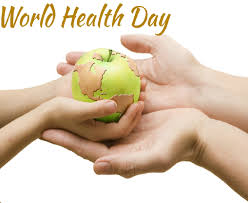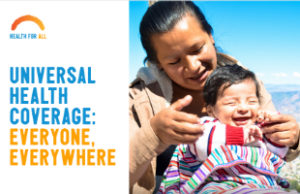Every April 7th is World Health Day
 OK, confession time. I had no idea that the World Health Organization (WHO) has sponsored a World Health Day since its founding in 1948. Is that a commentary on the WHO’s “advertising” efforts or my lack of awareness or both? I tend to think it’s a little of both. Regardless, the WHO uses its birthday to promote and raise awareness of the importance of health-related issues across the globe.
OK, confession time. I had no idea that the World Health Organization (WHO) has sponsored a World Health Day since its founding in 1948. Is that a commentary on the WHO’s “advertising” efforts or my lack of awareness or both? I tend to think it’s a little of both. Regardless, the WHO uses its birthday to promote and raise awareness of the importance of health-related issues across the globe.
The WHO was founded in the shadow of World War II with the easy to understand yet difficult to achieve goal of “…build[ing] a better, healthier future for people all over the world.” It’s one of those goals, like ending world poverty, that the international community strives for but will never achieve. However, if the WHO can “build a better, healthier future” for some people “all over the world,” then it is a goal worth pursuing. It now has offices in over 150 countries utilizing the assistance of over 7,000 people and directs and coordinates international health within the United Nations’ system. Its main areas of emphasis are:
- Health systems
- Promoting health through the life-course
- Noncommunicable diseases
- Communicable diseases
- Corporate services
- Preparedness, surveillance, and response

In 1948, the WHO held its first World Health Assembly and since then, has used April 7th, the day of its founding, to organize international, regional and local events related to a particular theme. Its World Health Day is one of eight global health campaigns and some of the others include World Tuberculosis Day, World AIDS Day and World Blood Donor Day. Since 1995, the WHO has picked a specific theme for its World Health Day, with the first being “international polio eradication.” Others have been: “safe motherhood” and “good health adds life to years.” This year’s theme is one that has been in U.S. headlines for years, universal health coverage.
 The WHO defines universal health coverage this way, “All people should receive quality health services, where and when they need them, without suffering financial hardship.” It does NOT mean free coverage for ALL health interventions, but coverage of essential health services from health promotion to prevention, treatment, rehabilitation, and palliative care. This World Health Day, the WHO is drawing particular attention to the fact that all United Nations members states, in 2015, agreed to try to achieve universal health coverage by 2030. Of course, “try” is the very operative word in this agreement.
The WHO defines universal health coverage this way, “All people should receive quality health services, where and when they need them, without suffering financial hardship.” It does NOT mean free coverage for ALL health interventions, but coverage of essential health services from health promotion to prevention, treatment, rehabilitation, and palliative care. This World Health Day, the WHO is drawing particular attention to the fact that all United Nations members states, in 2015, agreed to try to achieve universal health coverage by 2030. Of course, “try” is the very operative word in this agreement.
In this country, roughly 30 million people are without health insurance. However, they do have ACCESS to health care services. Unfortunately, without health insurance, they must pay for that health care out of pocket, which can be prohibitive given the cost of quality health care. Hence the WHO’s caveat about getting access to health care “…without suffering financial hardship.” Thus, to the WHO, going into exorbitant and life long debt or being forced to choose between food or shelter and health care does not constitute universal health coverage.
Obviously, America and the rest of the world have quite a long road to travel to achieve the WHO’s noble 2018 World Health Day goal, but that shouldn’t preclude them, and us, from trying.
If you’d like more information, visit the WHO’s homepage here: http://www.who.int/en/



